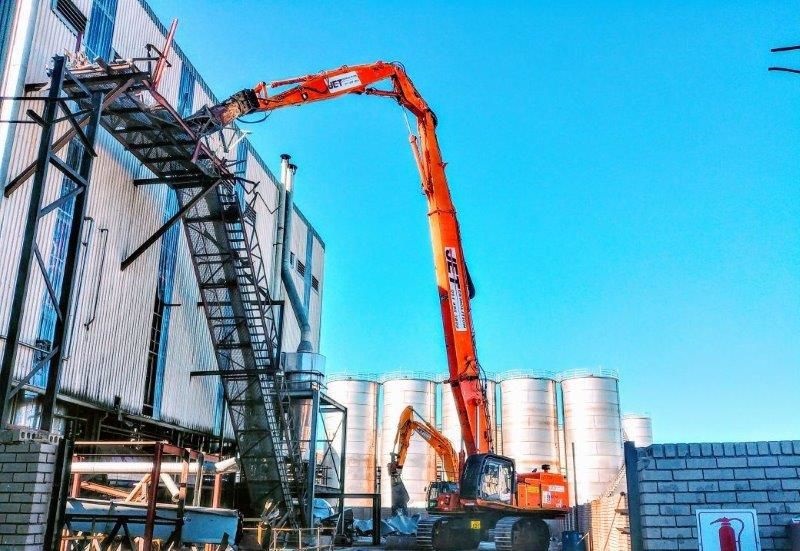
Subscribe & Follow
Advertise your job vacancies
Jet Demolition pioneers cold-cutting tech for petrochemical demolition
Cold-cutting techniques developed by Jet Demolition have introduced a new benchmark for health and safety in the petrochemical industry, which represents a highly volatile and hazardous work environment.

A high-reach demolition excavator fitted with a hydraulic shear, working immediately adjacent to an operational facility.
The equipment and methodology pioneered by Jet Demolition has the added ‘green’ benefit of limiting incidental contamination of natural resources, which is generally unavoidable using less advanced techniques.
This proactive approach has resulted in the demolition specialist having completed over 100 projects for a leading local petrochemical producer, as well as undertaking work for the bulk of the major players in this sector, Jet Demolition's project engineer, Andre Botes reveals.
Apart from oil and gas facilities, Jet Demolition’s expertise also encompasses hexane plants, chemical plants, fuel tanks, and storage facilities.
“Petrochemical demolition forms part of our heavy industrial demolition portfolio. It is critical to pay close attention to every step in the demolition process during petrochemical work, as we normally work in close proximity to live operations, with a high degree of danger due to the flammability,” Botes explains.
Having worked for Jet Demolition for a decade, Botes forms part of a close-knit team of engineers.
“Most are involved in supporting our site staff on a technical and commercial basis, or after a successful tender, managing the project itself,” he points out.
The risk of fire means that conventional demolition methods are not always not suited to the petrochemical industry. “We normally make use of large excavators with specialised attachments like shears,” Botes highlights.
“We have also developed quite a few specialised attachments to work in these zero-flame areas, where we cannot risk any spark or any emission due to the volatile nature of the surroundings.”
The company’s fleet includes a selection of diverse demolition shears and ripping tools of various sizes and weights for added flexibility in flammable environments. The demolition shears, in particular, range from a few hundred kilograms to over 12 tonnes, including the largest version in Africa at present.
“Our state-of-the-art cold-cutting equipment means we can carry out demolition work in the most volatile environments without impacting our clients’ operational processes, which is critical in terms of downtime and productivity,” Botes elaborates, adding that Jet Demolition has effectively pioneered cold-cutting technology in South Africa.
Botes adds that Jet Demolition has a fully-fledged safety department that deploys safety officers to all sites, and often more than one depending on the complexity of the project. “In addition, we have developed specific safe work and operating procedures for the petrochemical industry,” Botes stresses.
A typical petrochemical demolition project takes four to eight weeks to carry out, with all the necessary equipment usually moved on-site two weeks’ prior. While Jet Demolition has carried out successful petrochemical demolition work in Africa, Botes comments that there is much more scope in the rest of Africa, especially with the oil price on the increase.





